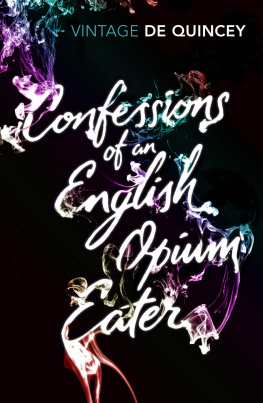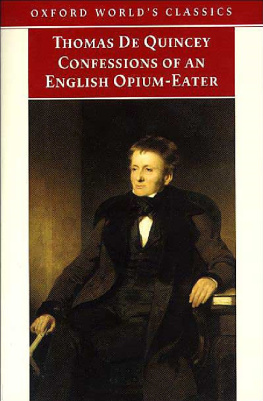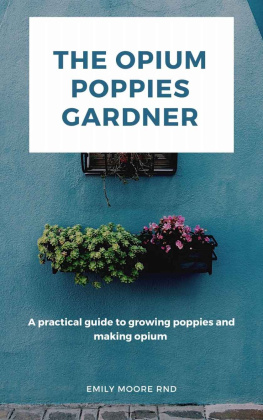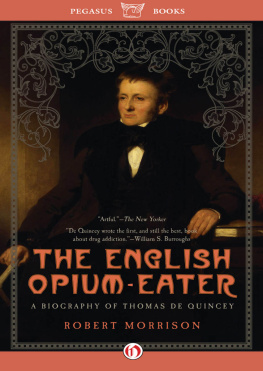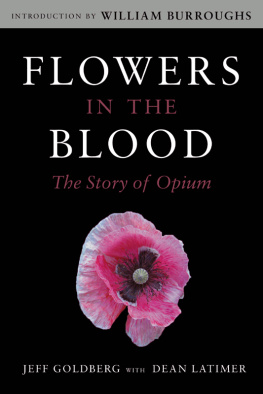Contents
About the Book
WITH AN INTRODUCTION BY HOWARD MARKS
Once upon a time, opium (the main ingredient of heroin) was easily available over the chemists counter. The secret of happiness, about which philosophers have disputed for so many ages, could be bought for a penny, and carried in the waistcoat pocket: portable ecstasies could be corked up in a pint bottle. Paradise? So thought Thomas de Quincey, but he soon discovered that nobody will laugh long who deals much with opium.
About the Author
Thomas De Quincey was born on 15 August 1785 in Manchester, the son of an affluent cloth merchant. He ran away from the Manchester Grammar School aged seventeen and lived in poverty in Wales and London before being reconciled with his family. He then attended Oxford University, where he first began to take opium. Despite excelling at his studies, De Quincey left university without completing his degree and married Margaret Simpson, the daughter of a local farmer. Having exhausted his inheritance, partly due to his addiction to opium, De Quincey found work as a journalist and wrote prolifically on various subjects for numerous publications. Confessions of an English Opium-Eater was published in the London Magazine in 1821 and found instant success. He went on to write several novels and biographies, and his unusual autobiographical style made his work extremely popular on both sides of the Atlantic. When De Quinceys wife Margaret died in 1837, his opium addiction worsened and he moved away from London to Scotland to relieve his straitened finances. He died in Edinburgh on 8 December 1859.

Introduction
eloquent opium! that with thy potent rhetoric stealest away the purposes of wrath and to the guilty man for one night givest back the hopes of his youth. Thou only givest these gifts to man; and thou hast the keys of Paradise, oh, just, subtle, and mighty opium.
Cultivation of opium for anaesthesia and treatment of dysentery began during the aptly named New Stone Age (10,000 BC), and its use was widespread in the Indian, Sumerian, Egyptian, Minoan, Assyrian, Greek, Persian, Roman, and Arab Empires. Opium, which contains morphine and codeine, was the strongest painkiller available to the ancient world and later enabled both the performance of prolonged life-saving surgical procedures and peaceful deaths for people with terminal illnesses. The most significant medical texts of the ancient world, i.e., those of the Ebers Papyrus (BC 1550), Dioscorides (AD 65), Galen (AD 175), and Avicenna (AD 1020) constantly refer to opiums use and properties.
Opium has long been associated with the Far East, particularly China, leading to the misconception that the Chinese have been caning themselves with the drug for several millennia. In fact, the opium poppy travelled along Arab trade itineraries from its Asia Minor roots into Persia, reaching India at the beginning of the Moghul Empire (in the sixteenth century) and only reached China in the seventeenth century, through Tibet and Burma. The word then current in China for opium, a-fu-jung, was derived from Arabic and meant foreign medicine.
The production of opium has not changed since ancient times. During ten days of its annual life cycle, the seed box of the opium poppy exudes a milky juice of extraordinary chemical complexity, still not fully understood. A bitter, brown, granular powder (commercial opium) is then derived from this liquid and swallowed raw. Tobacco also reached China during the seventeenth century, and smoking became popular and prevalent throughout the country. Tobacco smokers and opium eaters discovered the two substances combined to give a mixture that significantly increased the intensity of the opium effect and decreased the time taken to achieve it. Smoking is the quickest way to achieve a high from any drug as the oxide or vapour enters the arteries directly. Even mainliners have to wait until the blood traverses through the heart. The Chinese were quick to realise opium was addictive. A few grains would give the novice a feeling of euphoria that would inevitably be followed by a comedown, leaving the user with the choice of either giving up the drug or repeating and increasing the dose. Giving up precipitated acute withdrawal symptoms, including giddiness, a chill over the whole body, aching limbs, diarrhoea, watering of the eyes, prostration, torpor, and agonising psychic misery. Confucian morality holds that the body is not ones own to abuse: it has been entrusted by ones ancestors. Accordingly, an Imperial decree against opium was enacted but had little effect on the constant trade of opium across Chinese borders, fed primarily by the East India Company, who saturated the eager Chinese with the drug. Opium smoking became endemic and led to the Opium Wars between China and Britain, the history and consequences of which are fascinating but beyond the scope of this introduction.
However, as the historian Richard Newman stated in his excellent article Opium Smoking in Late Imperial China: Opium smoking undoubtedly produced some addicts, and some of those addicts were reduced to a pitiable condition, but it is not their image that should be foremost in the mind; we should also remember the peasants carrying their lumps of poppy juice to market, the boatmen wrapped in their blankets passing around an opium pipe in the twilight, and the Chinese gentleman smoking peaceably at home with his friends. It is not the existence of addiction that requires explanation so much as the fact that, in a society in which opium was cheap and widely available, so many people smoked lightly or not at all. The production and consumption of opium were, for most people, normal rather than deviant activities, and it is the implications of this normality which ought to be explored, both for the sake of Chinas history and for the sake of their relevance to modern societies learning to live with drugs.
Meanwhile, in Salzburg, a Swiss-German chemist Philippus Aureolus Theophrastus Bombastus von Hohenheim, better known as Paracelsus, had discovered (circa 1540) that the alkaloids in opium were far more soluble in alcohol than in water. Experimenting with various opium concoctions, he prepared a tincture most effective in reducing pain. Paracelsus named this preparation, which comprised opium, crushed pearls, musk, amber, and other substances, laudanum (praiseworthy). Physicians paid it scant, if any, attention for over a hundred years until Thomas Sydenham compounded a tincture, that he also named laudanum. It comprised opium, saffron, mercury, castor, hashish, ambergris, cayenne pepper, ether, chloroform, belladonna, musk, nutmeg, brandy, wine, and whisky. Thomas De Quincey ate laudanum; he never smoked opium.
Born into a prosperous mercantile family in Manchester in 1785, Quincey (the De was an affectation of his mother, added to his surname when he was a teenager) was traumatised by the death of his sister Elizabeth and tortured by the image of her head after a post-mortem had sliced off the top of her skull. He was a promising scholar, acquiring the art of conversing fluently in Greek, but he ran away from school and ended up in London, where he almost starved to death. He found refuge (but almost no food) in a lawyers house, where he shared a floor with an orphan girl whom he calmed during the ghostly night hours. Mrs De Quincey, in an effort to improve her sons motivation, enrolled him at Oxford. At the university, Thomas excelled academically, and was accepted and welcomed into the literary circle that included William Wordsworth and Samuel Taylor Coleridge. He lent Coleridge a large amount of money and eventually became the tenant of Dove Cottage, succeeding the Wordsworths. Nevertheless, De Quincey felt socially isolated and left Oxford without completing his degree. As William Bolitho, who wrote the introduction to an early edition of
Next page
